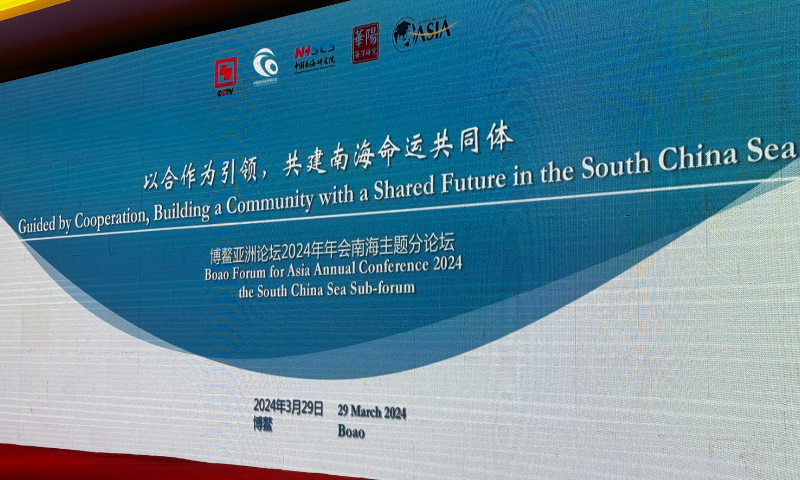Philippines urged to return to DOC commitment, avoiding actions that may further complicate the S.China Sea situation

Photo: Liu Caiyu/GT
The Philippines and other related countries should return to the commitment to the Declaration on the Conduct of Parties in the South China Sea (DOC) by refraining from actions that could complicate the situation and exacerbate disputes, said Chinese and international experts during the Boao Forum for Asia on Friday.
Some countries, represented by the Philippines, have taken unilateral actions in disputed waters, such as solidifying the occupation of reefs, engaging in large-scale reef construction, and conducting oil and gas exploration, which is the major driving force behind recent tensions in the South China Sea, Wu Shicun, chairman of the Huayang Research Center for Maritime Cooperation and Ocean Governance and founding president of the National Institute for South China Sea Studies, said at a panel discussion.
Facing provocations from the Philippines, China has primarily exercised restraint to uphold peace and stability in the South China Sea and maintain its relations with ASEAN, noted Wu.
However, this should not lead certain countries, especially the Philippines, to underestimate China's determination and capability to respond to such provocations, Wu cautioned. He further remarked that signals from statements by spokespersons of the Chinese Ministry of National Defense and the Ministry of Foreign Affairs suggest a hardening stance from China in response to repeated provocations from the Philippines.
"China does have bottom lines, but its patience is limited. Some countries may think that China cannot go further, but this is a misjudgment," noted Wu.
Wu told the Global Times that if the Philippines openly begins construction with steel and concrete on Ren'ai Jiao, China will take action. The possibility of China restoring Ren'ai Jiao to its "previous unoccupied state" cannot be ruled out.
China has indisputable sovereignty over the Nansha Islands, including Ren'ai Jiao, and their adjacent waters. China's sovereignty and relevant rights and interests in the South China Sea are established through a long historical course and are firmly grounded in both history and international law.
The South China Sea issue cannot define the entirety of China-Philippine relations, yet it undeniably poses a significant obstacle. Should the Ren'ai Jiao dispute escalate, it risks consuming the entirety of China-Philippine relations, Wu cautioned.
Throughout the panel discussion, the Global Times noticed that attendees from Indonesia, the Philippines, Vietnam and China shared common ground in maintaining a peaceful and stable South China Sea. At the same time, they are also on the same page regarding the risks brought by the intervention of external forces.
The involvement of external powers could lead to unintended consequences for the South China Sea, said Shafiah Muhibat, the Deputy Executive Director for Research at the Centre for Strategic and International Studies, Indonesia, during Friday's panel discussion.
"Increased tension, more incidents, or anything that may lead to an open conflict are definitely not in any party's interests … No country wants to see an all-out conflict in the South China Sea," Shafiah pointed out.
"Other external countries may appear to be concerned about the peace and stability of the South China Sea, but this is not genuine concern because once problems arise, it is us who will be the victims and bear the costs," Wu said.
To prevent the escalation of the situation in the South China Sea, Wu emphasized that the Philippines and other claimant states should uphold their commitments outlined in the DOC. They should refrain from taking actions that could further complicate the situation and exacerbate disputes.
While regional countries are waiting for the Code of Conduct in the South China Sea (COC) agreement to be reached, the full implementation of the DOC should be respected, stressed Nguyen Hong Thao, a member of the International Law Commission and a professor of International Law at the Diplomatic Academy of Vietnam, at the panel.
When asked about China's response to increased military presence from certain small multilateral security cooperation alliances led by the US, Wu suggested that China should bolster the forces of the China Coast Guard in the region, enabling them to take necessary countermeasures when required.
As ASEAN's efforts to reach an agreement with China on the COC will take time, with difficult issues yet to be resolved despite recent efforts to accelerate the process, many attendees at the panel discussion called for more cooperation among regional countries to expand their common interests and mitigate divergence.
Shafiah called for regional countries to capitalize on existing opportunities and create new ones for the peace and stability of the South China Sea. "Engagement and fostering regional cooperation are indispensable."
Wu advocated for providing more public goods for regional countries as one approach to mitigate and de-escalate disputes. He mentioned the establishment of marine observation stations and ocean science research laboratories on certain islands or reefs.

